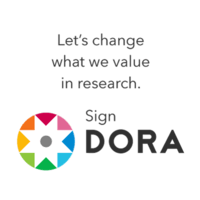San Francisco Declaration on Research Assessment
 | |
| Formation | 13 May 2012 |
|---|---|
| Headquarters | International organization |
| Leader | Stephen Curry, Imperial College London |
| Website |
sfdora |
The San Francisco Declaration on Research Assessment (DORA) intends to halt the practice of correlating the journal impact factor to the merits of a specific scientist's contributions. Also according to this statement, this practice creates biases and inaccuracies when appraising scientific research. It also states that the impact factor is not to be used as a substitute "measure of the quality of individual research articles, or in hiring, promotion, or funding decisions".[1]
The declaration originated from the December 2012 meeting of the American Society for Cell Biology. On May 13, 2013, more than 150 scientists and 75 scientific organizations had signed the declaration.[1][2] The American Society for Cell Biology states that, as of 10 May 2013, there are more than 6,000 individual signatories to the declaration and that the number of scientific organizations "signing on has gone from 78 to 231" within two weeks.[3] As of 14 December 2017, the number of individual signatories has risen to over 12,800 and the number of scientific organizations to 872.[4] Some organization signatories in 2017 include the British Library, Nature Research, BioMed Central, Springer Open and Cancer Research UK.[5]
Motivation
On 16 December 2012, a group of editors and publishers of academic journals gathered at the Annual Meeting of The American Society for Cell Biology in San Francisco to discuss current issues related to how the quality of research output is evaluated and how the primary scientific literature is cited.[6]
The motivation behind the meeting was the consensus that impact factors for many cell biology journals do not accurately reflect the value to the cell biology community of the work published in these journals. The group therefore wanted to discuss how to better align measures of journal and article impact with journal quality.
All the above considerations also extend to other fields and the organizers consider DORA a worldwide initiative covering all scholarly disciplines. In fact, the declaration has been signed by scientific associations with general scope, such as:
by more specialized associations working in fields quite removed from biology, such as the
by some universities and other general institutions such as the
There is also an alarming trend for the citation of review articles over primary literature, driven in part by space limitations that are imposed by some journals. Because this citation bias contributes to lower citation indices for journals that focus mainly on primary literature, the group discussed ways to combat this trend as well.
The outcome of the meeting and further discussions was a set of recommendations that is referred to as the San Francisco Declaration on Research Assessment, published in May 2013.[6]
Signatories
As of February 7, 2018, all seven UK research councils had signed the declaration.[7] 21 out of 96 UK research universities surveyed had signed as of December, 2017.[8]
See also
References
- 1 2 Alberts, Bruce (May 17, 2013). "Impact Factor Distortions". Science. 340 (6134): 787. doi:10.1126/science.1240319. PMID 23687012.
- ↑ Van Noorden, Richard (May 16, 2013). "Scientists join journal editors to fight impact-factor abuse". Nature News Blog.
- ↑ Fleischman, John (May 30, 2013). "Impact Factor Insurrection Catches Fire with Over 6,000 Signatures and Counting". The American Society for Cell Biology.
- ↑ "Dora - ASCB". ASCB. Retrieved 14 December 2017.
- ↑ "Dora - ASCB". ASCB. Retrieved 2017-05-01.
- 1 2 Cagan, R. (2013). "San Francisco Declaration on Research Assessment" (PDF). Disease Models & Mechanisms. 6 (4): 869–870. doi:10.1242/dmm.012955. PMC 3701204. PMID 23690539.
- ↑ Curry, Stephen (2018-02-07). "Let's move beyond the rhetoric: it's time to change how we judge research". Nature. 554 (7691): 147. doi:10.1038/d41586-018-01642-w. PMID 29420505.
- ↑ Gaind, Nisha (2018-02-12). "Few UK universities have adopted rules against impact-factor abuse". doi:10.1038/d41586-018-01874-w. Retrieved 2018-02-16.
Further reading
- John Bohannon (June 2016). "Hate Journal Impact Factors? New study gives you one more reason". Science Magazine.
- Simons, K. (2008). "The Misused Impact Factor". Science. 322 (5899): 165. doi:10.1126/science.1165316. PMID 18845714.
- Archambault, Éric; Vincent Larivière (2009). "History of the journal impact factor: Contingencies and consequences" (PDF). Scientometrics. 79 (3): 635–649. doi:10.1007/s11192-007-2036-x. Archived from the original (PDF) on 2013-05-31.
- Andrew Plume (3 June 2013). San Francisco Declaration on Research Assessment (DORA) – Elsevier’s view. A commentary on DORA by the Associate Director – Scientometrics & Market Analysis of major scientific journal publisher Elsevier.
- Curry, Stephen (2016). "Who's afraid of DORA?". Research Fortnight. Retrieved 14 December 2017.
- IEEE (2018). "The Culture of 'Publish or Perish' Is Hurting Research". The IEEE Institute.